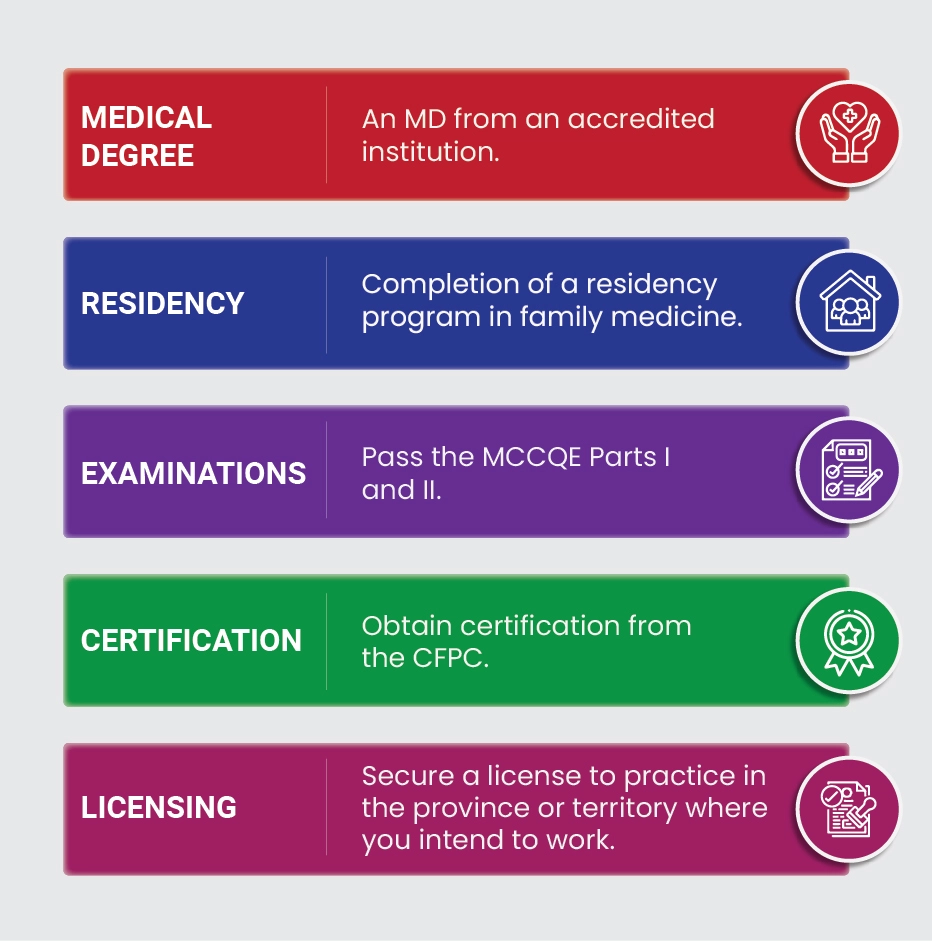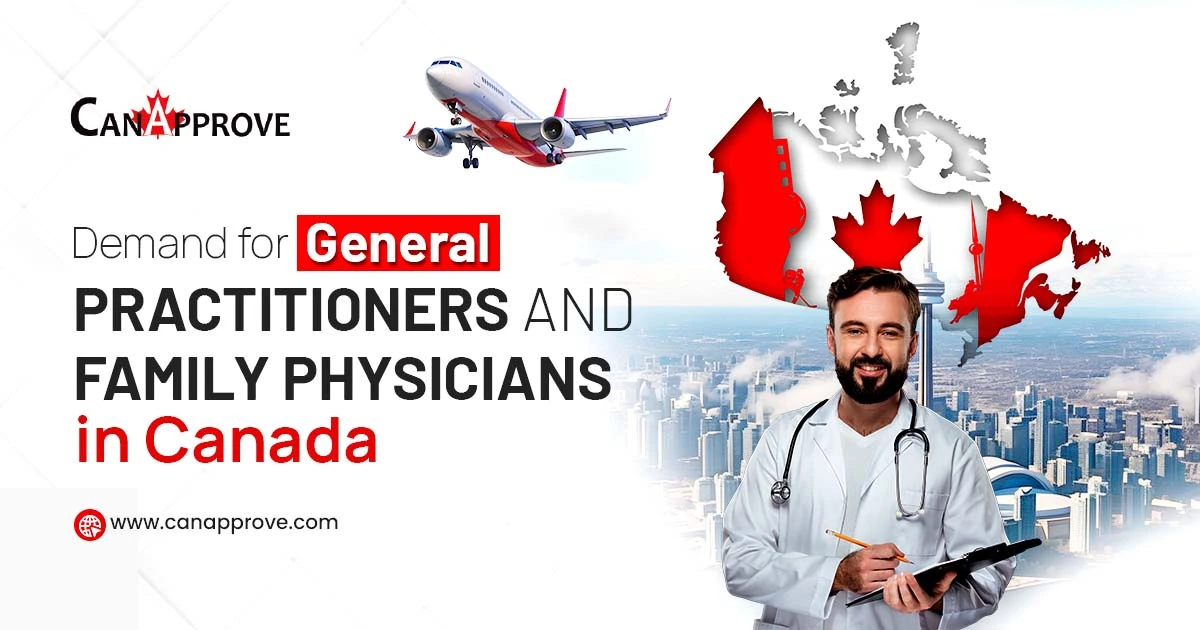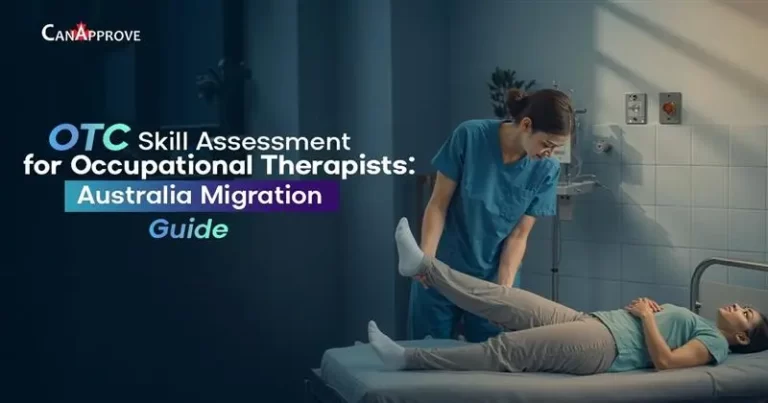Table of Content
1Overview2General Practitioners in Canada3Family Physicians in Canada4How to Become a General Practitioners in Canada5How to Become a Family Physician in Canada6Eligibility for General Practitioners and Family Physicians7Requirements for General Practitioners and Family Physicians8Salary Details for General Practitioners and Family Physicians9NOC 31102 Job description10Wrap Up11Frequently Asked Questions ( FAQ )
Overview: General practitioners and family physicians in Canada
Family doctors and General Practitioners are some of the most prominent specialists in the Canadian healthcare system. These individuals act as entry-level caregivers dispensing primary healthcare services, identifying diseases, and prescribing medications. Nonetheless, it is crucial not to confuse between GPs and Family Physicians through the analysis of the main aspects of their training and roles.
General Practitioners in Canada
General practitioners are medical doctors who work to assess and treat different diseases and illnesses. They practise in clinical settings, hospitals, or in private, see patients of all ages. GPs can also prescribe special treatment to the patients and refer them to specialists for further treatment when required. They can treat different illnesses, ranging from minor health complications to life-threatening ailments due to their general medical training.
Family Physicians in Canada
Like General Practitioners, Family Physicians are also involved in the provision of an all rounded healthcare service delivery, although they have taken their specialized training in family medicine. It lets them to offer long-term or even lifelong care of a person or a family, which is often the case. Family Physicians focus on patient care over the course of a person’s lifetime, knowing details about the patient’s care and treatment plans. These are employed for the purpose of consultation and care before illnesses develop, for conditions that require long-term attention, and for the fast-emerging, serious diseases; thus making them relevant community health assets.
How to Become a General Practitioners in Canada
So, you want to be a General Practitioner in Canada? Excellent choice! GPs in Canada are the go-to doctors for patients of all ages, handling everything from routine check-ups to chronic conditions. To become a GP, you’ll need to complete the following steps:
- Obtain a Medical Degree: Firstly, you’ll need to earn a Doctor of Medicine (MD) degree from an accredited medical school. This typically takes about 4 years.
- Residency Program: After your MD, you’ll enter a residency program in family medicine. This is a hands-on training period where you’ll work under experienced doctors to gain practical skills. Residency usually lasts about 2 years.
- Licensing Exam: Once your residency is complete, you must pass the Medical Council of Canada Qualifying Examination (MCCQE) Part I and Part II. This is your ticket to practise medicine in Canada!
- Certification: Finally, you’ll need certification from the College of Family Physicians of Canada (CFPC). Once certified, you’re officially a GP!
How to Become a Family Physician in Canada
Now, if your heart is set on being a Family Physician, the path is pretty similar to becoming a GP, but with a few changes:
- Medical Degree: Like GPs, you’ll need to start with an MD degree from an accredited medical school.
- Family Medicine Residency: You’ll then complete a residency in family medicine, which provides training specifically focused on long-term patient care across all ages.
- Licensing and Certification: After residency, you’ll need to pass the MCCQE exams and obtain certification from the CFPC.
What sets Family Physicians apart is their deep commitment to building long-term relationships with patients and managing their health over time. They often work in community-based settings and provide ongoing care to entire families, making them an integral part of their patients’ lives.
Eligibility for General Practitioners and Family Physicians
Thinking about eligibility? Let’s break it down:
- Educational Background: You must have an MD degree from a recognized institution. If you’re an internationally trained doctor, you’ll need to have your credentials assessed and recognized by the Medical Council of Canada (MCC).
- Language Proficiency: You’ll need to demonstrate proficiency in English or French, depending on where you plan to practise.
- Residency Training: Completion of a Canadian residency program in family medicine is crucial, especially for those trained outside of Canada.
- Certification: Finally, certification from the CFPC is mandatory to practise as a GP or Family Physician in Canada.
Requirements for General Practitioners and Family Physicians
To practice as a GP or Family Physician in Canada, you must meet the following requirements:

Salary Details for General Practitioners and Family Physicians
Let’s talk about money. The remuneration of the GPs and Family Physicians depends on the place of work and years of experience in practice and can greatly vary depending on whether the physician works individually or for a healthcare facility.
General Practitioners Salary in Canada
On average, General Practitioners in Canada earn between CAD 150,000 to CAD 300,000 annually. Your earnings can vary based on the province you’re in, the number of patients you see, and how many hours you work.
Family Physicians Salary in Canada (Province Wise)
Family Physicians’ salaries also differ across provinces. Here’s an approximate range for some Canadian provinces:
- Ontario: CAD 200,000 to CAD 350,000
- British Columbia: CAD 180,000 to CAD 320,000
- Alberta: CAD 220,000 to CAD 370,000
- Quebec: CAD 190,000 to CAD 340,000
- Manitoba: CAD 170,000 to CAD 310,000
For a more detailed breakdown, check out this Canada’s job bank page.
NOC 31102 Job description for General Practitioners and Family Physicians
NOC 31102 is the National Occupational Classification code for General Practitioners (GPs) and Family Physicians in Canada. This classification provides a comprehensive overview of the duties, responsibilities, and qualifications associated with the role.
Below is a list of job titles that fall under NOC 31102:
- Civil aviation medical officer
- Community preventive medicine physician
- Company physician
- Doctor of Medicine (MD)
- Family doctor
- Family physician
- Family practitioner
- General practice intern
- General practice physician
- General practice resident
- General practitioner (GP)
- Industrial medical officer
- Industrial medicine physician
- Industrial physician
- Intern
- Locum doctor
- Medical doctor
- Medical missionary
- Medical officer – Canadian Armed Forces
- Medical officer of health (MOH)
- Missionary doctor
- Physician resident
- Primary care physician
- Public health physician
- Resident
- Resident physician
- Telemedicine family physician
General Practitioners and Family Physicians play a crucial role in the Canadian healthcare system, offering comprehensive care and building long-term relationships with their patients. As outlined under NOC 31102, their responsibilities encompass a broad spectrum of duties, from providing direct patient care to collaborating with other healthcare professionals. This role demands a high level of medical knowledge, ongoing professional development, and a commitment to improving patient health and well-being.
Wrap Up
It is an honour and privilege to become a General Practitioner or Family Physician in Canada since it is not only a noble profession that enables one to change people’s lives but also a fulfilling profession. By obtaining the appropriate education, training, and perseverance, you will be able to successfully practise medicine in this beautiful country. Moreover, the increased competition in paying reasonable and sometimes even attractive wages, together with the constant demand for healthcare personnel, it is the perfect time to turn your dream into reality!
For your migration journey, you can surely count on one of the leading immigration and study abroad consultants in India– CanApprove. Our experience spans 25 years in this field, and you’ll not get better advice anywhere else. Get in touch with our Canada immigration consultants to review your requirements in detail. Book a consultation now!





